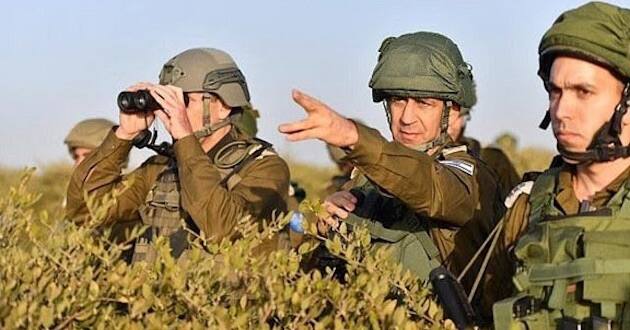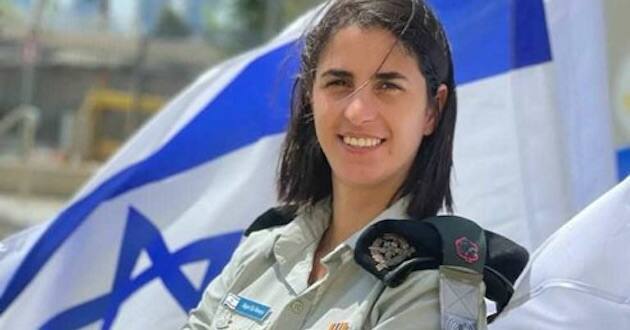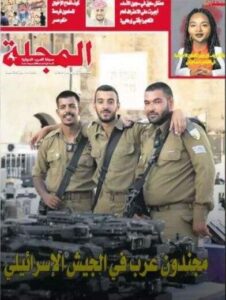An exclusive article in the English edition of the Saudi monthly magazine Al-Majallah is devoted to the topic of Arab Israelis who serve in the Israeli Defense Forces (IDF).
The lengthy and interesting article, by Suzan Quitaz, a Kurdish-Swedish journalist and researcher specializing in Israeli politics and the Gulf region, notes that the number of Muslim and Christian Arabs who serve in the IDF is on the rise, thanks to the IDF’s effective recruitment methods and outlook.
The feature story is capturing the imagination of Saudi citizens as relations warm with Israel as a result of the Trump-brokered Abraham Peace Accords. The historic agreements brought peace and economic cooperation between Israel and four (and county) Muslim nations. While Saudi Arabia was not officially part of the accords, ground work has been laid and the Saudi press is already reporting positively on Israel.

“IDF chief Aviv Kochavi visits Southern Command in undated photograph. (Credit: Israel Defense Forces)
Reviewing the topic from a very positive perspective, the article starts by noting that, contrary to the misconception prevalent in the media, the IDF is not predominantly Jewish, but is “a people’s army” that comprises members from all sectors of Israeli society, including many Arab soldiers, Druze, Muslim, and Christian, who serve at all levels alongside their Jewish comrades. It notes that the Druze community in fact has highest enlistment rates in all of Israeli society, including the Jewish sector, and that serving in the army has long been part of the identity of the Israeli Druze and a source of pride for them. A young Druze quoted in the article states that, during his service, he was never treated differently than his Jewish fellow-soldiers. “On the contrary IDF is one of the few institutions where everyone is treated equally and fairly,” he says.
The article goes on to note that, even in other Israeli-Arab communities, and especially among the Bedouins of northern Israel, the number of recruits has been growing in the recent years. It presents comments from a number of Arab soldiers and ex-soldiers who state that their sense of belonging and their desire to serve their homeland is what made them join the IDF. They also express that military service contributed to their personal and professional development, and that it is one of the gateways to equality in Israeli society. The article highlights the story of a young Arab woman who, defying the norms of her Arab society, enlisted in the IDF and is today a high-ranking officer. She originally joined the army without her parents’ knowledge, but today they are proud of her military career, as is she.
The article stresses that the IDF’s success in recruiting more and more Israeli Arabs is largely due to its effective recruitment mechanism, and specifically due to the efforts of the IDF unit in charge of recruiting minorities, which has subdivisions specializing in specific minority groups. An senior officer in this unit explains that it reaches out to young Arabs through schools and community centers, and today also through social media and by reaching out personally to potential recruits. The unit, he adds, ensures that each recruit is supported in terms of wellbeing and given the same professional progression like any other new enlistee. “Young Israeli Arabs are more aware of what the IDF is and what it can offer them in terms of career opportunities within the army itself or further education [in] post-army life,” he says.
The article admits that serving in the IDF is still very controversial among Israeli Arabs and that many fiercely oppose it. It quotes former Israeli Arab MP Hanin Zoabie, who claims that Arab soldiers in the IDF do not enjoy equality, and join the army only because they are poor and unemployed. She claims further that Israel recruits them for political reasons, in order to sow division among Israeli Arabs. Replying to these claims, Hassan Kaabia, an Israeli Arab and a former Lieutenant Colonel who served in the IDF for over two decades, states that “the IDF is the only institution where there is no discrimination and there is total equality and inclusion. It is not true that they are joining because of economic factors. The majority of Israeli Arabs who join the army are doing it because of one reason and that is they want to be part of the state.” He also wryly points out that one of Zoabie’s close relatives served in the IDF.
The article concludes with remarks by the officer from the unit in charge of recruiting minorities, who states: “Israel is a multi-faith and cultural society with many minorities. The IDF can be a great platform to connect all of to us to our homeland, Israel.”
The following are excerpts from the article, as published in Al-Majallah.
“It is early morning in the Negev desert, a battalion of soldiers crawls across the desert sand with assault rifles cocked. It’s a routine military exercise, but these are no ordinary combatants – they are Arabs who have voluntarily chosen to fight and even sacrifice their lives in order to protect the State of Israel. These young men, and some women too, are proud to be part of the Israel Defense Forces (IDF). One of these young men is sergeant Emad, who proudly says ‘It’s an honor, to hold in one arm the assault rifle and on the other arm the holy Koran, to defend my homeland, Israel’
“There is a massive misconception in the mainstream media about the Israeli Army. Most people believe it’s predominately Jewish, and it was at its early inception… [But] the IDF has changed greatly in the decades since it was born. Today, the IDF represents the whole nation, ‘the people’s army,’ in which Israeli Jews, Druze, Muslims, Arabs, Bedouins and Christians all are brothers in arms.
“Druze – IDF’s Highest Enlistment in Entire Israel
“The Druze, an Arabic-speaking minority of about 150,000, roughly 2% of Israel’s population, mostly live in the northern regions of the Galilee, Carmel and the Golan Heights.
“In 1956, Druze leaders signed a ‘covenant of blood’ with the Israeli government, conscripting the community into the IDF making it as the only non-Jewish minority serving, though Druze women are exempt. Serving at the IDF has ever since been part of Druze identity and source of pride, love and loyalty to Israel.
“In fact, above 80% percent of Druze men enlist in the IDF, the highest enlistment percentage of all communities and sectors of Israeli society, including Israeli Jews.
“Tawfiq from Qalansum, in northern Israel tells Al-Majalla, ‘I was youngster when I enlisted, I was looking for a proper career and IDF offers so many development opportunities. Early in my service I was attached to a battalion in which most of the guys didn’t know much about the Druze, their culture and history. And here, I had the opportunity to teach them about my community. I see Israel as our homeland, it is a tiny state in the Middle East, and we are all obliged to defend it. Defending Israel was the main reason why I joined and stayed in the IDF for 25 years. Any Druze citizen you may come across will tell you that they are proudly patriotic and will share with you the love they feel towards this land. During my service I was never treated differently than my Jewish Israeli fellow-soldiers. On the contrary IDF is one of the few institutions where everyone is treated equally and fairly. Most IDF teams would have a mix of Jews, Muslims, Christians, and Bedouins. We were all equal, and career progression was based on one’s potential and merits and not if he is Jewish or not.'”
“Dr Anan Wahabi served in the IDF for 30 years. Today, among other things, he teaches at the International Institute for Counter Terrorism in Herzliya. He says, ‘The IDF, for me on a personal level, was the institution that took me out from my village and helped me progress on the career ladder and become the person I am today. I am from the sixties generation, my generation grow up with two flags: the Druze and the Israeli one, they both are part of my identity and I am proud to wave both of them. Tell me, where in the Middle East is there a minority in the national army that is allowed to be proud of its ethnicity and wave its flag? The Israeli flag, is my flag and I fought in many wars defending what this flag stands for.’
“The Arab Society in Israel
“In 1957, the Israeli government designated the Druze as a distinct ethnic community separate from Palestinian Muslims and Christians who live inside Israel. The Arab citizens of Israel, also known as Israeli Arabs, among whom are those who call themselves Palestinian citizens of Israel, are descendants of the 160,000 Palestinians who remained in their towns and villages after the State of Israel declared independence in 1948. Arab citizens of Israel represent one-fifth of the total population and they form the overwhelming majority of Israel’s 20% percent non-Jewish demographic.
“Yussef Saluta, 20, an Israeli Arab soldier from the Desert Reconnaissance battalion takes part in a drill near Kissufim in southern Israel November 29, 2016. (Reuters)
“Israel has a population of about 10 million – of those 74.3% identify as Jewish, followed by Muslim about 17.9%, Christian 1.9%, the Druze roughly 2% and some other religions under 4%, e.g., followers of the Bahai faith.
“Ella Waweya and the making of the impossible possible
“Ella’s story is an extraordinary one – she was born in 1989 in the Israeli Arab town of Qalansawe, a few miles from the city of Netanya. She joined the IDF in 2013 and completed her training as an exemplary soldier and participated in many operations. In 2015 she received the President’s Outstanding Medal. In September 2021 Ella was promoted to the rank of Major in the Israel Defense Forces and became the first Arab Muslim woman to attain this rank.
“Al-Majalla met up with Ella in the city of Tel Aviv. The first thing one noticed, is how proud she is of her multi-identity as a woman, Arab, Israeli and Muslim, and proudly bears her rank in the army. It could not have been easy for a young Arab girl to go against the norms of familial and societal expectations of what women can and can’t do, and on the top of that joining an army that often portrayed extremely negatively in Arabic media and circles.
“She tells us that ‘For the first 18 months, I kept it secret that I joined the army, but during home leave on a weekend my mother came into my room without knocking and found my IDF uniform. She looked at the uniform, turned her gaze to me and began to cry, but quietly so that no would hear her.’ Eventually, when it became known in her hometown that she works for the IDF, Ella was to become subject to negative reactions with some people choosing to distance themselves from her. But this brave confident woman took it all in stride.
“It took Ella’s father almost a year and half to forgive her for joining the IDF. But eventually he accepted her choice, and he was proudly telling people that his daughter is in the army. Sadly, her father died of coronavirus before getting the chance to see his daughter becoming the first Arab woman IDF Major. Her mother attended the ceremony when Ella got her major’s bar. ‘I am proud of her, of course. My daughter, praise be to God, did nothing wrong … she built herself with her own hands,’ her mother said.
“Today, Ella is the Deputy Head of the IDF’s Arab Communications Department, her target audience is the hundreds of millions of Arabic speakers in the Middle East and around world. To Arabic social media surfers, she is known as ‘Captain Ella,’ the face and voice of the Israel Defense Forces.
“Since late 2019, Ella no longer holds back from telling the whole world that she works for the IDF, ‘The Israeli flag gives me a sense of excitement, belonging and love,’ she proudly says.
“There are thousands of people like Ella, officers and soldiers who are proud of working for the IDF. Three decades ago, it was almost impossible for an Israeli Arab to even consider enlisting. A decade later, many of those Israeli Arabs who joined the army were afraid to reveal their IDF service publicly. However, times have changed and many young Israeli Arabs now see themselves more broadly and are proud to say ‘I am an Arab and an Israeli.’
“‘What are people looking for? Equality between an Arab and a Jew, a Bedouin, a Druze and a Christian. The path to equality passes through the IDF, the Ministry of Defense, and the police. That’s how its starts,’ said Ella.
“Recently, the Israeli Police released its recruitment report and it showed that more than 20% of the newly enlisted in the Israeli police force in the past year are Muslims and Bedouins.
–MEMRI | Middle East Media Report









